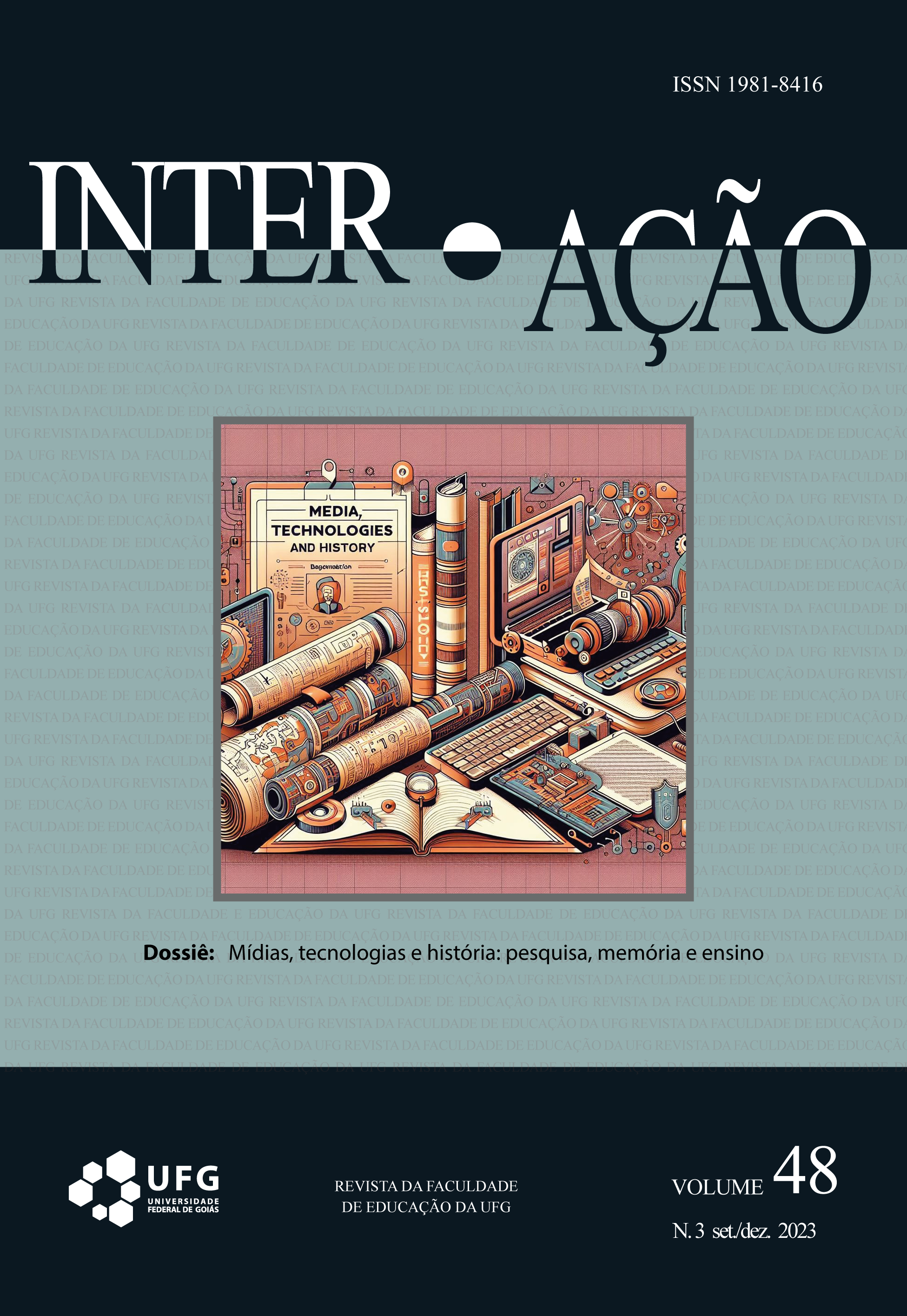CONCEPTS OF TECHNOLOGY OF HISTORY TEACHERS AT THE TIME OF DIGITAL EXPANSION
DOI:
https://doi.org/10.5216/ia.v48i3.76390Keywords:
Professor; Tecnologia; Ensino de História; Feenberg.Abstract
This article presents findings from research motivated by the epistemological curiosity of knowing whether history teachers, an area that tends to discuss humanity, its contexts, and cultures, would also share the hegemonic discourse in the face of digital technologies. Through content analysis of responses to questionnaires and interviews with history teachers, the research points to the predominance of the neutral conception of technology from two perspectives: instrumental and deterministic, based on Feenberg's contributions. The work adds to the few studies that pay attention to values, interests, and relationships to expose the political nature of technologies and points to the need for critical teacher training in a society increasingly oriented by digital lines.
KEYWORDS: Teacher; Technology; History Teaching; Feenberg.
Downloads
References
BARDIN, L. Análise de conteúdo. São Paulo: Edições 70, 2016.
BARRETO, R. G. Objetos como sujeitos: o deslocamento radical. In: FERREIRA, G. M. S.; ROSADO, L. A. S.; CARVALHO, J. S. (Org.) Educação e Tecnologia: abordagens críticas. Rio de Janeiro: SESES/UNESA, 2017. p. 124- 141. Disponível em: https://ticpe.files.wordpress.com/2017/04/ebook-ticpe-2017.pdf . Acesso em: 27 fev. 2019.
CARVALHO, J.; MARQUES, S.; PELLON, C. Literatura sobre educação e tecnologia com referencial de Paulo Freire: um retrato e um recorte crítico. Praxis Educativa, s.l., v. 16, p. 1-21, 2021. Disponível em: http://bit.ly/38x7Dba. Acesso em: 26 fev. 2021.
CARVALHO, J.; ROSADO, L.; FERREIRA, G. Rótulos e abordagens de pesquisa em educação e tecnologia. Revista Teias, Rio de Janeiro v. 20, n. 59, p. 219–234, 20 dez. 2019. Disponível em: https://bit.ly/2OStT8M. Acesso em: 26 fev. 2021.
COMUNIDADE ARTE E CULTURA (Brasil). O perfil do professor e historiador Yuval Noah Harari. 2020. Disponível em: https://comunidadeculturaearte.com/o-perfil-do-professor-e-historiador-yuval-noah-harari/ . Acesso em: 31 mai. 2023.
CUPANI, A. A tecnologia como problema filosófico: três enfoques. Scientiae Studia, São Paulo, v. 2, n. 4, p. 493-518, 2004. Disponível em: https://www.scielo.br/pdf/ss/v2n4/a02v2n4.pdf. Acesso em: 01 jul. 2020.
FEENBERG, A. Tecnologia, modernidade e democracia. Lisboa: Center for Innovation, Technology and Public Policy, 2015.
FELINTO, E. A religião das máquinas: ensaios sobre o imaginário da cibercultura. Porto Alegre: Sulina, 2005.
FERREIRA, G. M. S.; ROSADO, L. A.; LEMGRUBER, M. S.; CARVALHO, J. S. C. Metaphors we’re colonised by? The case of data-driven educational technologies in Brazil, Learning, Media and Technology, London, v. 45, n. 1, p. 46-60, 2020. DOI: 10.1080/17439884.2019.1666872. Disponível em: https://www.tandfonline.com/doi/abs/10.1080/17439884.2019.1666872. Acesso em: 09 dez. 2023.
FREIRE, P. Conscientização: teoria e prática da libertação. São Paulo: Cortez, 1979.
HARARI. Y. N. Homo Deus: uma breve história do amanhã. São Paulo Companhia das Letras, 2016.
HOBSBAWM, E. Era dos extremos: O breve século XX (1914-1991). São Paulo: Cia. das Letras, 1997.
MOROZOV, E. Big Tech: a ascensão dos dados e a morte da política. São Paulo: Ubu Editora. 2018.
NEDER, R. T. (Org.) A Teoria Crítica de Andrew Feenberg: racionalização democrática, poder e tecnologia. Brasília: Observatório do Movimento pela Tecnologia Social na América Latina / CDS / UnB / Capes, 2013.
PENNA, M. A. O Ensino de História nos tempos atuais de instabilidade política e econômica no Brasil: um estudo de caso no Instituto Federal de Educação, Ciência e Tecnologia de Goiás. História Revista, Goiânia, v. 24, n. 3, p. 87–107, 2020. DOI: 10.5216/hr.v24i3.62207. Disponível em: https://revistas.ufg.br/historia/article/view/62207 . Acesso em: 31 maio 2023.
PRENSKY, M. Digital Natives, Digital Immigrants. NCB University Press, v. 9, n. 5. oct. 2001
SANTOS, F. A. F. Concepções de tecnologia de professores e na literatura de História: desafios para formação. 2022. Tese (Doutorado) – Universidade Estácio de Sá, Rio de Janeiro, 2022. Disponível em: https://portal.estacio.br/media/4689279/francisco-marildo-reires-dos-santos.pdf. Acesso em: 09 dez. 2023.
SELWYN, N. Educational technology as ideology. In: SELWYN, N. Distrusting Educational Technology. Londres: Routledge, 2016. Disponível em: https://ticpe.files.wordpress.com/2016/12/neil_selwyn_distrusting_cap2_trad_pt_final.pdf . Acesso em: 20 abr. 2019.
Published
How to Cite
Issue
Section
License
Copyright (c) 2023 Francisco Amarildo Freires dos Santos, Jaciara de Sá Carvalho

This work is licensed under a Creative Commons Attribution-NonCommercial 4.0 International License.
Inter-Ação uses the Creative Commons Attribution 4.0 License for Open Access Journals (Open Archives Initiative - OAI) as the basis for the transfer of rights. Open access means making documents available on the Internet free of charge, so that users can read, download, copy, distribute, print, search, or link to the full text of documents, process them for indexing, use them as input data for software programs, or use them for any other lawful purpose, without financial, legal, or technical barriers.
Authors publishing in this journal agree to the following conditions:
1) Authors retain copyright and grant the journal the right of first publication, with the work simultaneously licensed under the Creative Commons Attribution License, which permits redistribution of the work with attribution and first publication in this journal.
2) Authors are permitted to enter into additional, separate agreements for non-exclusive distribution of the version of the work published in this journal (e.g., for publication in an institutional repository or as a book chapter), with attribution and first publication in this journal.
3) Authors are permitted and encouraged to publish and distribute their work online (e.g. in institutional repositories or on their home page) at any time before or during the editorial process, as this may generate productive changes as well as increase the impact and citation of the published work.















